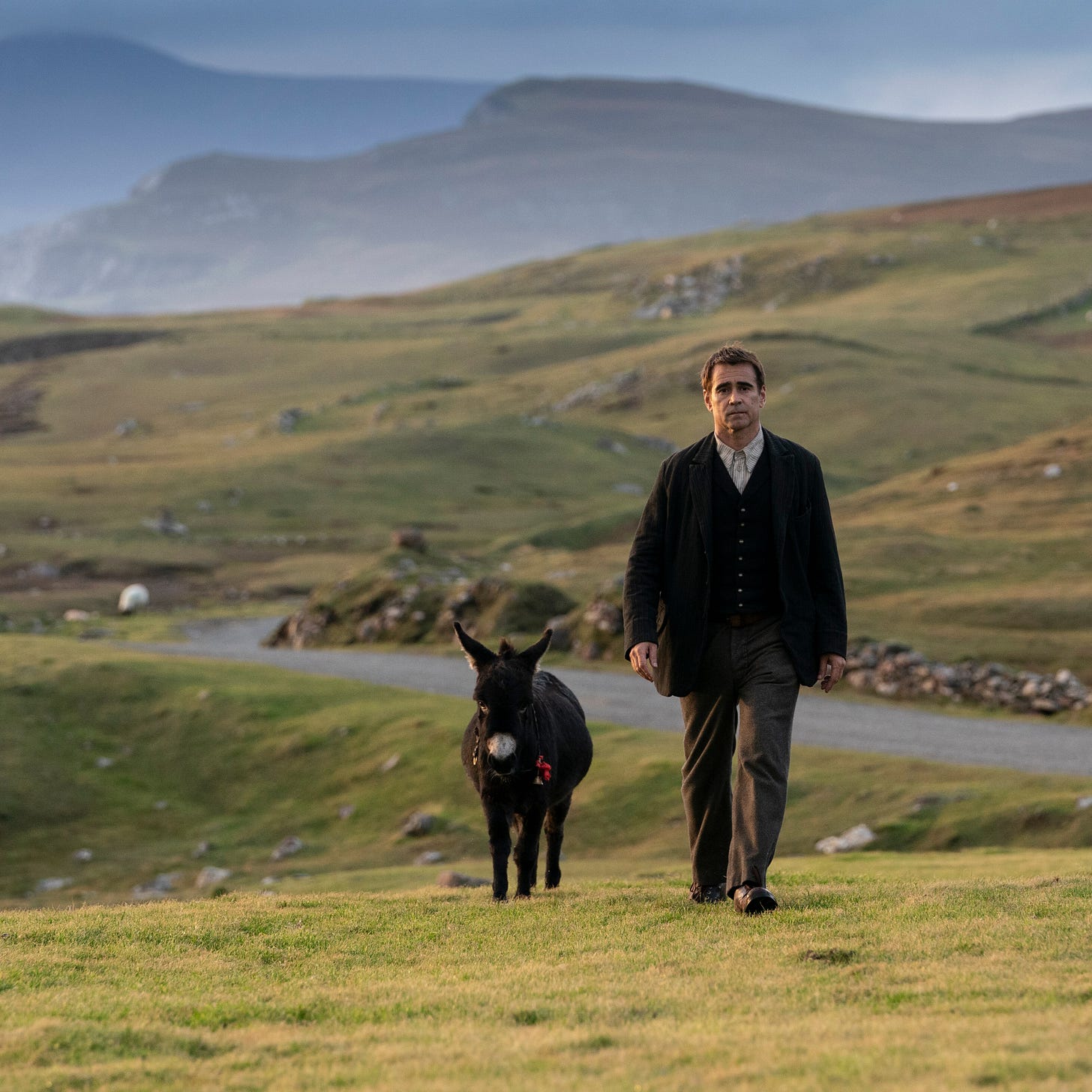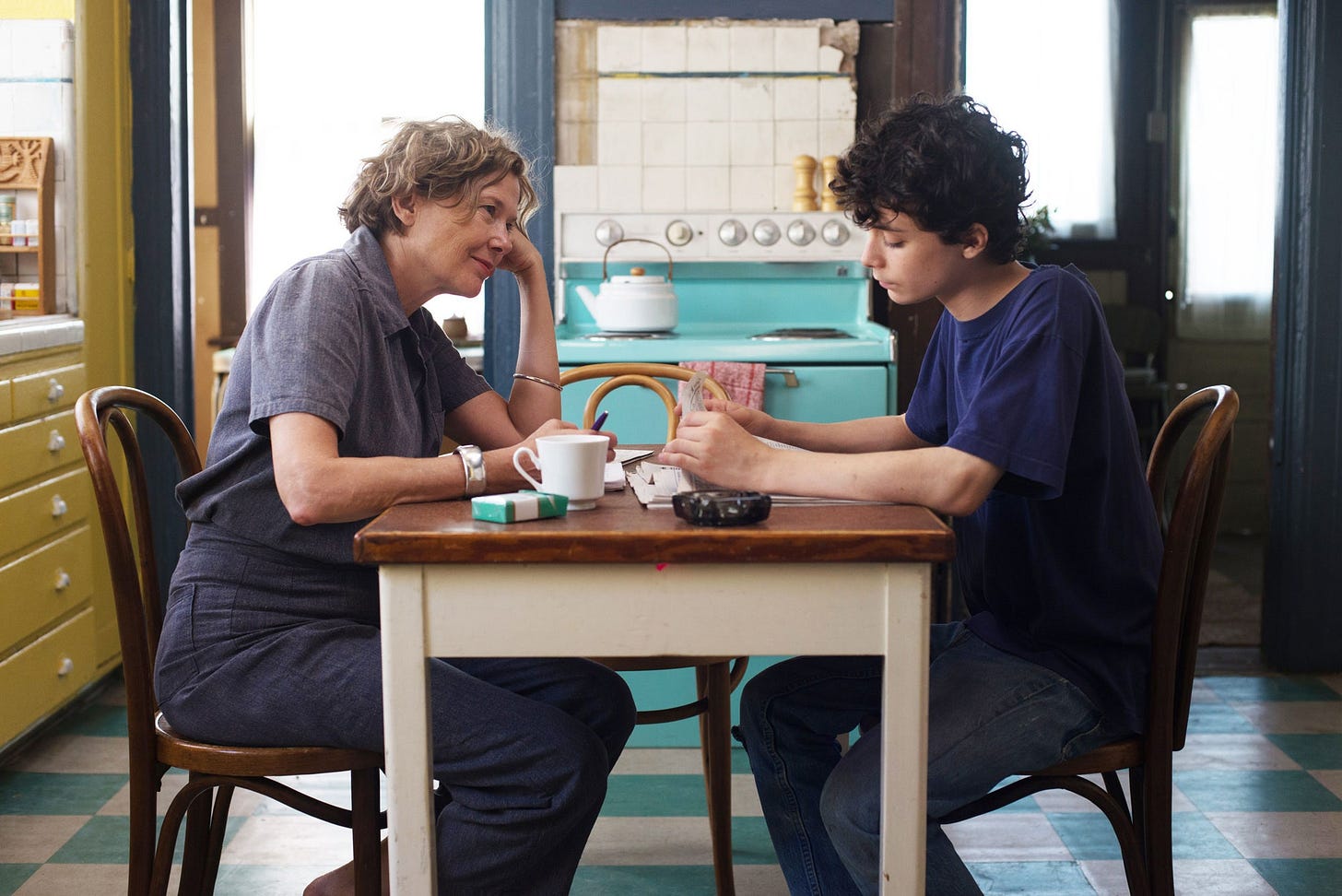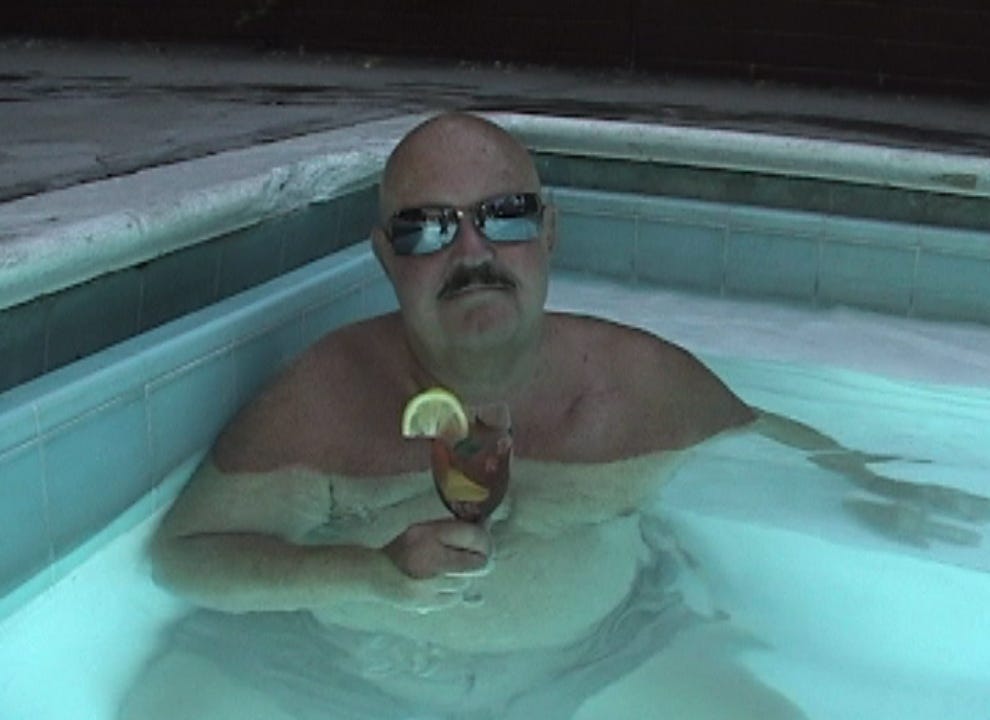Na Banshees an 20ú hAois, Weekly Reel #39
Martin McDonagh continues making great films with The Banshees of Inisherin, an A24/Annapurna classic about Mike Mills’s childhood, and a zero-budget documentary.
News of the Week: An unusual week with two Watch Nows, one Save For Later, and, again, no Passes. It’s that time of year where all the summer duds are behind us, and international festival contenders are released weekly.
Watch Now
The Banshees of Inisherin (2022, Martin McDonagh, Ireland/UK/USA) is the second installment by the Great Irish Trio of Colin Farrell, Brendan Gleeson, and Martin McDonagh—MM is London-born but to Irish parents, and his last name further solidifies his paddy identity. Their first film was McDonagh’s debut feature, In Bruges, which immediately placed him in gilded circles of critical acclaim. He had started his career as a London playwright before crossing the North Atlantic to make Seven Psychopaths, with Farrell in tow, a decade ago. He stayed and made Three Billboards Outside Ebbing, Missouri half a decade ago, which won Sam Rockwell and Frances McDormand Oscars. Then several years later, he returned to his ancestral Éireannaigh.
Farrell plays Pádraic Súilleabháin, the shoe-size-idyllic-town herder, who’s too simple for a settlement of seventy-four simpletons. His daily drinking pal, Colm Doherty (Gleeson), one day abruptly decides to cut Pádraic out of his life. He’s consciously nearing death and would prefer focusing on songwriting with his fiddle than hearing Pádraic’s long-throated stories about his donkey’s shites. Pádraic is gobsmacked by this artificially backwards-moving change in friendship status, so he pesters Colm, demanding answers. The year is 1923 and a civil war is popping off on the mainland within ear-view of the fictional island of Inisherin. The strained friendship sets up the brother v. brother allegory, but not exactly.
Pádraic lives with his surrogate mother-sister, Siobhán (the amazing Kerry Condon), smartest and most worldly-inclined member of the island due to her book-reading ability. After Colm’s cold shoulder, Pádraic’s daily friend becomes Dominic (Barry Keoghan), the town hooligan, whose father is the town’s lone policeman who regularly beats, and perhaps sexually abuses, him. With his added hours of focus per day, Colm begins writing “The Banshees of Inisherin.” But Pádraic persists in his diplomatic entreaties to re-establish relations, which prompts Colm to offer an ultimatum that for every time Pádraic talks to him, he’ll cut off one of his own fingers—starting with his fiddle-playing hand—and deliver it bloodied-fresh to him. Here is where it becomes a McDonagh picture.
McDonagh specializes in the mundane humor associated with the absurdities of ultra-violence. This film isn’t action-oriented like In Bruges, which is more slapstick than screwball. Banshees thrives on the language and character level. Most jokes are subtle and involve the adjective fecking. The civil war in the distance quickly becomes a minor setup detail, like Colm’s seaside residence or Pádraic’s black donkey that’s allowed inside against Siobhán’s wishes. Dominic’s policeman father is excited to attend a hanging on the mainland without knowing which side is hanging which. If there is a metaphor, then it’s that relations with your friends, neighbors, and family are vastly more significant than a faraway civil war that’s percolating. A conflict that might soon artificially intrude on those relationships without your permission.
The film’s style, but certainly not language, reminds me of Yorgos Lanthimos’s violentiam reductio ad absurdum style, who also uses Farrell for the same purpose. He can’t stop taking these roles as men exploring different aspects of their masculinity: as hitman (In Bruges), father (The Killing of a Sacred Deer), brother (Cassandra’s Dream), hospitalized POW (The Beguiled), John Smith (The New World), Alexander the Great (Alexander), cucked husband and potential lobster (The Lobster), and, of course, the Penguin (The Batman). Farrell won the acting award at the Venice Film Festival and will finally, most likely, get his first Oscar nod.
Make sure to catch The Banshees of Inisherin at a theater near you, which will be playing for the next week or so.
20th Century Women (2016, Mike Mills, USA) is, that’s right folks, our second pick of the week. It’s about the Mills’s upbringing in seventies’ socal, which stars Annette Bening (Dorothea, mother), Elle Fanning (Julie, friend), and Greta Gerwig (Abbie, sister/friend). Lucas Jade Zumann plays Jamie, the fifteen year old surrogate for Mills, who lives with his single mother and two other boarding residents, Abbie and William (Billy Crudup). Forty years separate mother and son, so she enlists the help of Abbie and Julie, a girl two years older than Jamie that sneaks into Jamie’s room most nights just to sleep, to help raise him in the confusing world of 1979, post-hippie punk socal.
As per the title of the film, it’s about the women of that era who raised Mills/Jamie. One night, Julie tells Jamie that she had unprotected sex and the guy came inside of her. She he buys her the pregnancy test, and she later tests negative. Then, Jamie accompanies Abbie to the doctor’s office, where she finds out that her cervical cancer is benign but left her too weak to support a child to full term. While Julie is the friend-zoned bff, Abbie is the cool older sister that takes Jamie to punk shows and introduces him to second-wave feminist lit. Wanting to also experience a modern-day re-awakening for herself and to get close to Jamie, Dorothea convinces Abbie to go out to a show. After her disappointment at not being able to ingratiate herself, Dorothea comes to an understanding that Jamie is bound for a different generational path than hers. That they will always be close as mother/son but could never be good friends.
20th Century Women is filled with these kinds of character-driven portraits of humans bound up in the social context they derived from. For each of the characters, we get a brief snapshot of their upbringing and how they came to live in this Santa Barbara boarding house. Dorothea was sixteen when the war forced her out of aviation school and into a drafting job, where she met Jamie’s father. They divorced as quickly as they made Jamie, which left Dorothea, at forty years old, to raise him alone and further relinquish her dreams to duties brought on by life’s necessities. Jamie was raised in the Vietnam/Watergate era, where protests, drugs, computers, and boredom were the daily activities of youngsters. Julie was raised with an intense therapist mother who made her attend group youth sessions, which led Julie to sleep around, beginning at fourteen, after her mother married a man with a Cerebral Palsy daughter. Abbie is a decade older than Julie and Jamie and grew up in Santa Barbara. In 1973 she moved to NY for art school, got into photography and David Bowie, and learned to dance away her sadness. She was then diagnosed with cancer, which alienated her from her friends, so she moved back home to SB.
For each of the characters, Mills is sympathetic and supposedly based off the female figures in his own life that raised him. Life writing via cinema has become more popular in the last decade, which one can see in many A24 distributions. Greta Gerwig, who plays Abbie, released Lady Bird the following year for A24 and is about her upbringing in norcal. Annapurna Pictures, a production company founded by Megan Ellison—daughter of the seventh wealthiest person in the world—a decade ago, produced 20th Century Women and other auteur films. It’s rare for an American, non-government funded production company to finance these kinds of films. But the rewards have been fruitful so far: The Master, Her, Phantom Thread, Booksmart, Hustlers, Bombshell, and many others.
20th Century Women does a great job at taking out the cheese of a cheesy childhood memoir. He allows the characters to exist in their own reality, which happens to closely resemble but not bow-down to his own. One feels the effects of time-passed and imprinted-memories having a positive ROI on Mills. He’s paying tribute to the women of his twentieth century.
Subscribers of fuboTV, hoopla, Showtime, and DirecTV can watch 20th Century Women, but I recommend watching for free on Kanopy if you couldn’t have seen The Banshees of Inisherin at a theater.
Save for Later
Camp Hollywood (2004, Steve Markle, USA/Comedy) is a free documentary you can watch on YouTube. It’s about the Highland Gardens hotel in Hollywood that once hosted the rat pack’s afternoon drinking sessions, among other celebrity gatherings. In one of the rooms, Janis Joplin overdosed and died. By 2004, it was the home for young Canadians trying to make it in Hollywood and struggling American artists that have been doing the same for decades. Steve Markle brought his camcorder to document his sixty-day stay there while he tried to make it in standup comedy. He follows around an eclectic group of nobodies, though Mark Margolis and Saul Rubinek make mentorship appearances, that we quickly fall-in with. We know they probably won’t make it big as television stars; the odds are more stacked against them than the CA Lottery’s Powerball. Nonetheless, we root for them as they go to their pre-#MeToo casting couch auditions…
This doc is a no-budget entry into my favorite sub-genre of Ross McElwee cinéma de la vie documentaries. Without any reference or subjects or setups, the documentarian turns on the camera, goes about their normal lives, and asks the people around them banal biographical questions. What’s revealed is more powerful, I think, than anything coming from the cinéma vérité or other purported slice-of-life documentary styles. The style is extremely difficult to pull off. The filmmaker, or rather a person who presses record on his camera, needs to have an eye for capturing the compelling in the everyday. How does one go about that? They need to have an intuition for characters and situations that makes them resemble a comedian preparing jokes more than a filmmaker writing scripts and drawing storyboards. McElwee is accidentally humorous, John Wilson (who just released How To with John Wilson on HBO with Nathan Fielder producing) is overtly, and Markle—who dreams of becoming a comedian and not a filmmaker—is at his best in Camp Hollywood when capturing the juxtaposition of people with lofty dreams and their daily activities of jobless pool lounging and nightly parties.
The documentary will pleasantly surprise you and can be quickly consumed in seventy-one minutes.
Pass
¯\_(ツ)_/¯
Thank you once again for checking out my Substack. Hit the like button and use the share button to share this across social media. And don’t forget to subscribe if you haven’t already done so.






